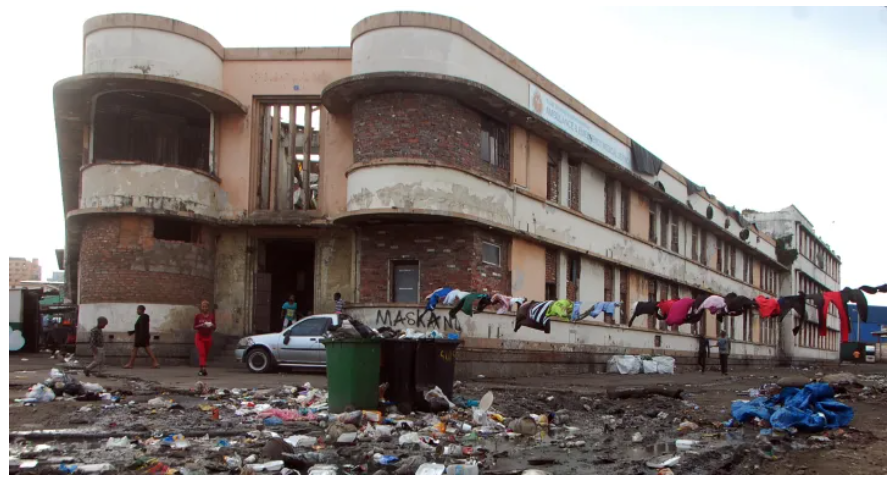
South Durban Still Rocks
September 16, 2017
Soothing a Savage Wife
November 17, 2017All is not as green as it should be.
I’ve been writing this column in my head for years. It started as a rattle when, in my teens, I first read William Wordworth’s poem, The World Is Too Much With Us. Since then it has reached
a roaring crescendo. Almost a lifetime in the making: it must out and when it is done, let it rot. Our hyper-consumer, throw-away society is violently out of control. In South Africa we are belatedly becoming aware of the perils of pollution. It’s not as pressing as it is in madly overpopulated countries, but swelling landfill sites are becoming more hazardous. Highways are choking up, there is a proliferation of factory belching chimneys and smog filled cities are becoming ever-present.

Edible Wooden Spoons
The reality of the human crush, and its attendant waste problems, was driven home on a trip to India. For all its spiritual beauty, India is coming to grips with some serious pollution issues and, gratefully, it is rapidly raising awareness. I have been in touch with an Indian entrepreneur who makes edible wooden spoons. Narayana Peesapaty is a chemical engineer who did specialist work in ground water systems. He produces a range of edible cutlery, mostly wooden spoons that are biodegradable. He says in the US alone every year Americans consume 40 billion plastic utensils.
How many are recycled and how many land up clogging landfills or rivers? The move to minimise our impact on the planet is growing, and speaking for myself, I have become evangelical about waste separation, so much so that at home I have reduced our family’s garbage to landfill from about eight black bin bags a week to two. The rest is recycled.

Bea Johnson, aiming for a zero waste home.
Look at the horrors of plastic proliferation. Whole swathes of the ocean are gyres of plastic; sea life are either choking on plastic or strangled in a tangle of plastic; the seabed is a growing mound of discarded tyres; and the fish we eat contain plastic micro beads. If you doubt for one moment the severity of the problem, even locally, walk along the beachfront near Blue Lagoon the day after a big thunderstorm. It is littered with an almost unimaginable array of plastic junk.
And to what end? The world produces a lot of meaningless junk. British columnist George Monibot wrote a brilliant column ranting about how pathological consumption appeared
so benign but was killing the world. He slated silly Christmas gifts, from belly button brushes to “a confection of ‘hilarious’ plastic and electronic” gifts that provided 30 seconds of entertainment and were then sent to landfill, their “impacts will ramify for generations”.
Monibot wrote: “The fatuity of the products is matched by the profundity of the impacts. Rare materials, complex electronics, the energy needed for manufacture and transport are extracted and refined and combined into compounds of utter pointlessness.” Fossil fuels were used in the
manufacture of these plastics, and electrons and forests felled and rivers poisoned to manufacture talking fish. Let’s stop trashing the planet, Monibot raged.
I watched in awe last month when a modern day hero made an appearance in Durban. Bea Johnson is a charismatic champion for change, and since 2008 she and her family in California USA have had a virtually zero waste home. They live by the mantra of the 5 R’s: refuse to buy more things, reduce your material needs, recycle whatever you can, reuse as best you can, and let the rest rot by decomposition. The results have been phenomenal. Johnson says her family’s living expenses have shrunk 40% and their impact on the world has dramatically reduced. I can’t do justice to her incredible story in a few lines, suffice to say a huge element of her success has been getting rid of clutter, buying in bulk (using glass jars) and rejecting packaging – mostly plastic. In South Africa Petco is an organisation advocating plastic recycling of plastic bottles or those made of Polyethylene Terephthalate, from cold drink buddy bottles to dishwashing liquid bottles. Last year their efforts saw 90 000 tons of plastic recycled in South Africa.
Petco estimates about 33 bottles make up a kilogram, and while the price varies, recyclers paid R3,80 a kilogram at the time of going to print. I think eThekwini Municipality is missing a trick with scavengers who scrounge through waste. Why not add to what the recycler will pay to create an incentive for people to collect more plastic waste? You might think it odd for the editor of a business magazine to write about the environment. Suggesting we produce and consume less seems inimical to business as we know it – especially as firms thrive by growing and selling more. But, if we don’t change the current business model we’ll choke the life out of the planet.
If you haven’t watched Leonardo di Caprio’s arresting documentary, Before The Flood, I urge you to. It’s free to view on YouTube. When Wordsworth wrote The World Is Too Much With Us, he was foaming at the industrial revolution and humanity’s fixation with materialism at the expense of nature. I suggest you let this column rot when you have finished reading it, so please try and recycle this magazine once you are done with it. We have a host of thought provoking “green” stories in this edition. Hopefully green will soon lose its status as a tag and become a cherished way of life. As Bea says, the choice is yours, you just have to exercise it. I hope you also enjoy the other varied offerings in this edition of Business in Durban, and find the people behind The Big Box story as inspiring as I did. It was also fantastic to feature Sbu Shabalala and his success, as it is to celebrate the rising, home-grown superstar Zapper.
We also look at the sartorial elegance that can be mustered in eThekwini, and chase the dream that is film city Durban. Finally, I’d be stoked if you’d stay in touch with feedback or story ideas.


